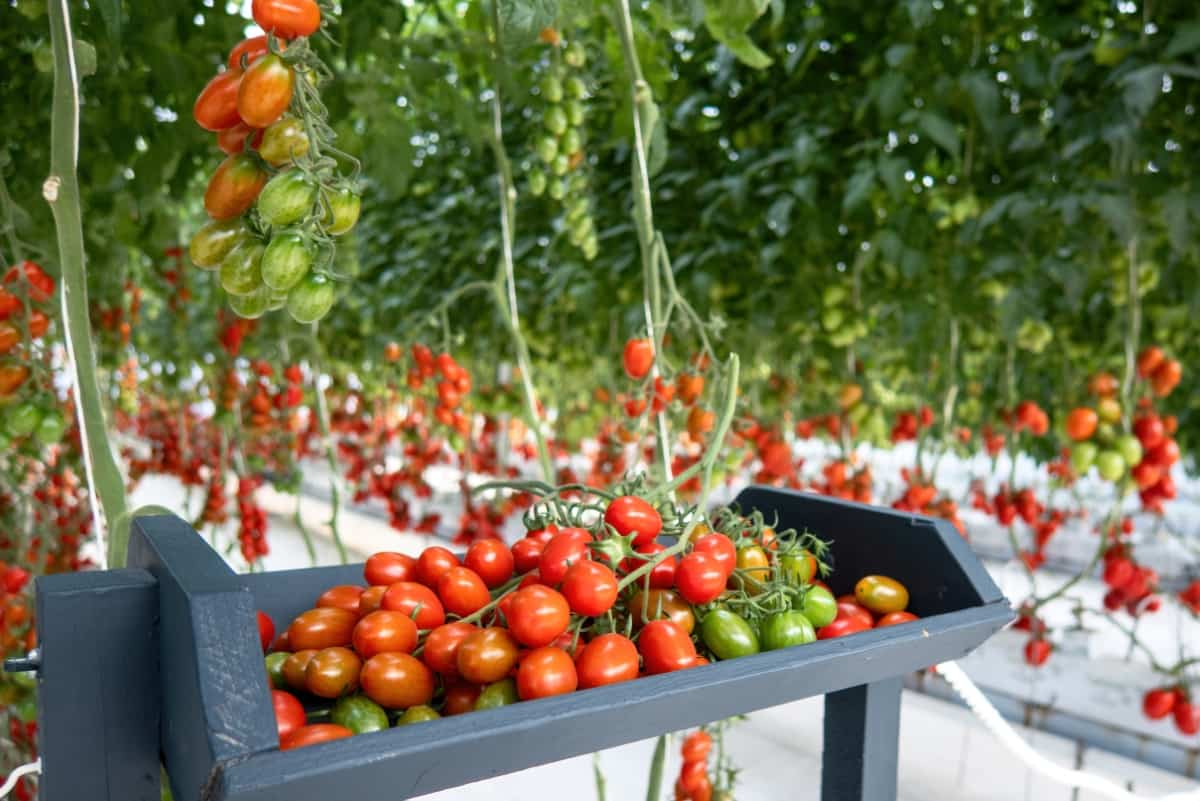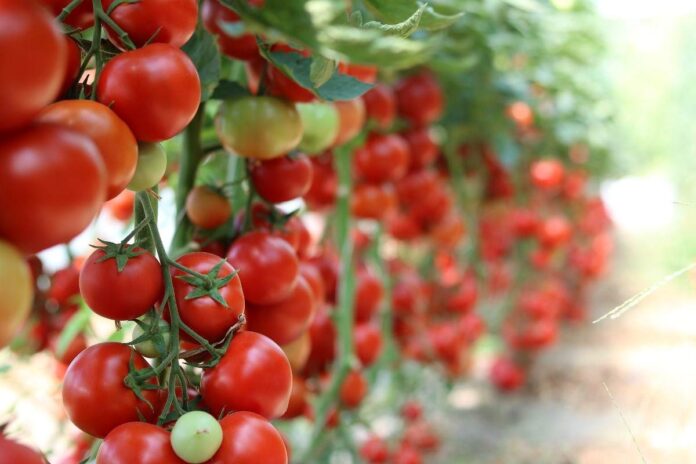Hello Gardeners, we are back with growing abundant tomatoes in the backyard. This high-yield tomato guide covers soil prep, organic pest control, common problems fixation, fertilization and watering schedules for maximum yields. What are we waiting for, let’s start digging the soil for tomato bountiful harvest in backyards gardens.
Soil Preparation and Nutrient Requirements for Tomato Plants
Soil is the foundation for your tomato garden and it is recommended to test the soil for nutrient deficiances. Soil with well-drainage and a pH range of 6.1 to 6.8 is the basic requirement. To boost organic matter, you can amend the aged manure or compost in the soil. For maximum soil fertility you can amend the soil with 4 to 5% of organic compost. It is better to avoid clay soils as they retain more water and result in tomato plant root rot disease.
Ideal Soil Requirements for Tomato Plants
| Factors | Ideal Range/Type |
| Soil pH | 6.1–6.8 |
| Organic Matter/Compost | 4–5% of soil composition |
| Drainage | Loamy and well-draining soil |
| Main Nutrients | High phosphorus, potassium, and calcium |
Selection of Right Tomato Varieties

Choosing the best tomato types and variety for your climate, season and area is a key factor. Usually, bush type (Determinate) tomatoes are ideal for small spaces and containers. Vine types (Indeterminate) are ideal for vertical growing and full season production. Apart from these, disease resistant tomato varieties are best for healthy and high yields.
Popular Tomato Varieties with Their Maturity Time
| Type | Few Examples | Ideal For | Days to Maturity |
| Determinate | Roma, Bush Early Girl | Containers, small spaces | 60–75 days |
| Indeterminate | Cherokee Purple, Sungold | Continuous harvest, vertical gardening | 70–90 days |
| Disease-Resistant | Celebrity, Mountain Merit | Humid climatic regions | 70–80 days |
Planting and Spacing Techniques of Seedlings
Tomato plants thrive best in areas where 7 to 8 hours of sunlight is expected.Plant tomatoes after the last frost with seedlings depth greater than than their nursery pots for strong growth. Ideal planting space in a tomato garden is 24–36 inches. Using straw or black plastic mulch will conserve the water usage and be helpful in cooler climates for soil warm up.
In case if you miss this: Weed Management in Tomato Crops.
| Factors | Recommendation |
| Sunlight | 7-8 hours daily |
| Timing | Once last frost is passed and when soil temp > 65°F |
| Seedling/Seed Spacing | 24-36 inches |
| Depth | Bury ⅔ of stem of seedlings |
Watering Schedule and Mulching Ideas
Tomato plants require a good amount of water for their growth cycle, good fruit size and flavour. Watering frequency depends on plant growth stage and season. Using drip irrigation for watering at the plant base ensures optimal water usage and avoids any fungal diseases.

Covering tomato plants base with mulching material such as dry straw or dry leaves or plastic black mulch sheet or grass clippings will enhance water usage efficiency. This will also prevent weed growth and soil erosion. For a better Idea, check the watering schedule for tomato plants below.
| Factor | Recommendation |
| Frequency of watering | 2–3 times per week |
| Amount of application | 1–2 inches weekly |
| Watering Method | Base watering with drip |
Support Systems for Tomato Plants
Vine type tomatoes require strong support to prevent breakage and healthy vertical growth. There are several methods of supporting plants. You can use cages, stakes, or trellises.
| Support Type | Best For | Pros | Cons |
| Indeterminate varieties | Indeterminate varieties | Cost-effective | Requires tying |
| Cages | Determinate varieties | Easy to use | Bulky storage |
| Trellises | Small spaces | Maximizes airflow | Labor-intensive |
Protecting Tomato Plants from Pests and Diseases
Aphids and hornworms are the main culprits in tomato gardens. These problems can be fixed by using organic solutions like neem oil. Hand picking is also another effective method. Find some issues with tomato plants and prevention and fixing solutions.
| Problem | Organic Fix | Preventive Tips |
| Early Blight | Copper fungicide | Remove infected leaves |
| Aphids | Insecticidal soap | Companion planting (marigolds) |
| Blossom End Rot | Calcium-rich amendments | Consistent watering |
Ways to Prune Tomato Plants
To improve airflow, prevent some diseases, remove “suckers” (side shoots) of indeterminate tomato plants. Regular pruning should be done on determinate tomato plants. Here are some guidelines of pruning tomato plants. Don’t prune tomato plants when they are nearing the peak of fruit production as it considred as too late to prune stage and one of the tomato pruning mistakes. Usually this is applicabel for summer tomato crops which is mid to late summer. For proper timing and stages, you take a look at tomato pruning diagram. These tips are also useful for pruning indeterminate container tomatoes.
In case if you miss this: Drip Fertikgation in Vegetable Crops.
| Tasks | Frequency | Tools |
| Remove side shoots (suckers( | Once in a week | Clean shears |
| Trim lower leaves | Twice a week | Gloves |
Ways to Harvest and Storing Tomatoes

Check the fruit color for maturity of tomato and harvest only when fully colored and slightly soft. You can store at room temperature and keep them in the refrigerator if they are over ripe. Find some harvesting tips below.
| Stage | Signs to Observe | Storage Methods |
| Green | Firm, pale | Paper bag with banana |
| Ripe | Uniform color, slight give | Room temperature |
Yield of Tomato Fruits per Plant
The yield depends on the variety, care and growing conditions. Here is the expected average fruits per plant for different varieties
| Variety | Type | Yield per Plant in lbs |
| Roma | Determinate | 8–10 |
| Sungold | Indeterminate | 11–15 |
| Beefsteak | Indeterminate | 9–12 |
| Celebrity | Determinate | 13–18 |
| Heirloom | Indeterminate | 6–8 |
Troubleshooting Common Issues
Cracked fruits and yellow leaves are common issues and these have to be addressed as soon as possible to protect the yield. Here are some reasons and preventive tips for these issues.
| Symptoms | Causes | Fixing Tips |
| Flower Drop | Extreme heat | Use green shade cloth |
| Yellow leaves | Overwatering/nutrient deficiency | Adjust water/fertilizer |
| Fruit crack/split | Too much of water (dry period followed by heavy water) | Maintain water balance |
Conclusion
Growing tomatoes in your backyard is rewarding with proper care. To acheive bountiful harvst of tomatoes, carry out regular watering, pruning, and pest control. Choosing right varieties based on cliame, soil and season is foremost factor for abundant tomatoes in your backyard garden.

